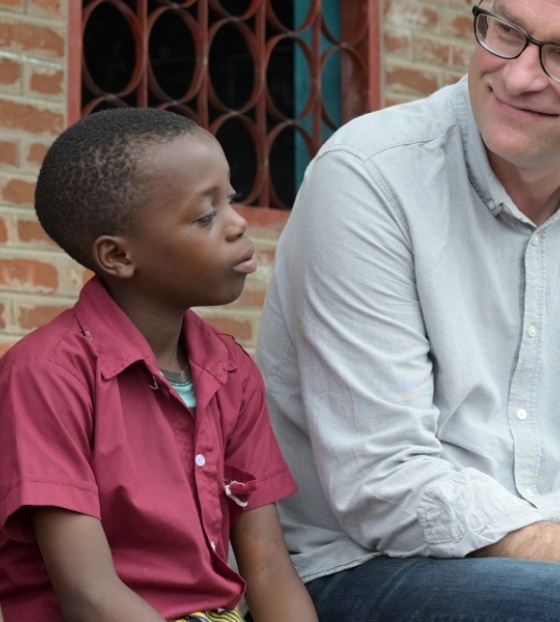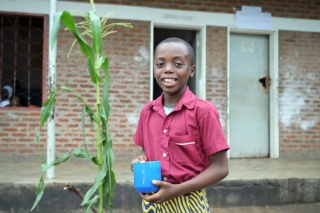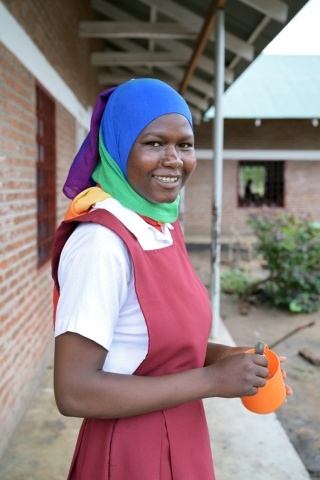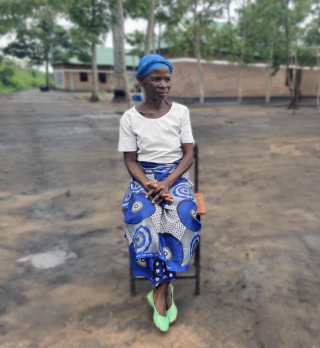
Child hunger and the impact of drought in Malawi
The pupils, headteacher and village chief from Mtusa village in Malawi talk about how failed harvests and drought are affecting their lives.
Mary’s Meals recently started feeding at a primary school in Mtusa village in Malawi. At the time of our visit, malnutrition was clear to see in the children that came to school, many with distended stomachs poking out from behind unbuttoned school shirts.
It’s not just the school aged children who are hungry in the village. Younger siblings and volunteers often wait to see if there might be any leftovers from the school feeding programme that they can scrape together for themselves.
In this article, we hear from learners Desire and Fatra on how Mary’s Meals is giving them the energy to concentrate and learn, and from headteacher Agness Wakili and village chief Dorothy Sumaili on the impact drought is having on food insecurity and hunger in the region.

“I often sleep on an empty stomach”
Desire is the youngest of four children. At 13 years old, he is very small for his age, and painfully thin. He says: “Finding food is hard, I often sleep on an empty stomach. I feel weak and [have] pain in my body when I don’t eat. When there was no food at school, I would shiver and shake so much I couldn’t hold my pen, and it was difficult to concentrate. Now, the porridge helps me concentrate and I have energy to help my mother and do chores around the house.”
Fatra is 16 and lives with her grandparents, 5km away from the school. She says: “The challenges around hunger and having enough food are really bad – I had nothing to eat last night. Most days are the same. Before feeding started I would be sleeping in class because hunger makes you tired. I want to complete my education and be a bank manager.”

“Every family in our district suffers from hunger”
Agness Wakili, headteacher at the school, says: “Every family in our district suffers from hunger. The harvest will be very poor because of the drought – the rain we have had in the past few days is not enough to sort it out. The maize is stunted and won’t mature properly. People had to plant again in December because the rain didn’t come.”
“People don’t eat at home because there is nothing to eat. The learners come for something to eat and then they are able to learn. Even the adults are starving – volunteers eat the remains of the phala (porridge) from the bottom of the pot.”
“We have seen an increase in enrolment because of the porridge. All the children around here are malnourished and very hungry, but now since the porridge, they are not so sick.”

“People have nothing and there is nothing to harvest”
Dorothy Sumaili is the village chief of Mtusa village. She says: “The current hunger situation affects the whole community and everyone is worried. It feels very different this year – 2024 was dry, but we managed to stay OK. But now people have nothing and there is nothing to harvest. Basic costs have doubled since last year. There is no maize to buy even [if] they have money.”
“I am very happy for the introduction of porridge late last year. It’s the only food the learners eat at the moment. They have nothing until the next day at school and they don’t get food at the weekends. I have three grandchildren at the school. Phala is helping by giving them energy. I am so thankful to Mary’s Meals for coming to our school and for the porridge.”
Yet, amid the failed crops and widespread hunger, our school feeding programme is providing a lifeline to children and their families in Malawi.